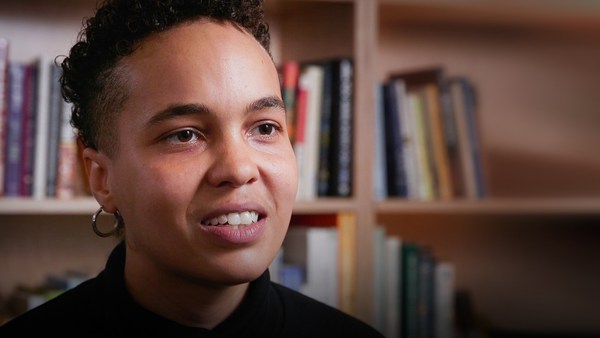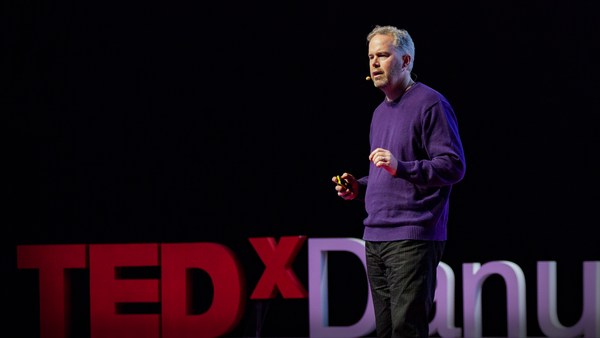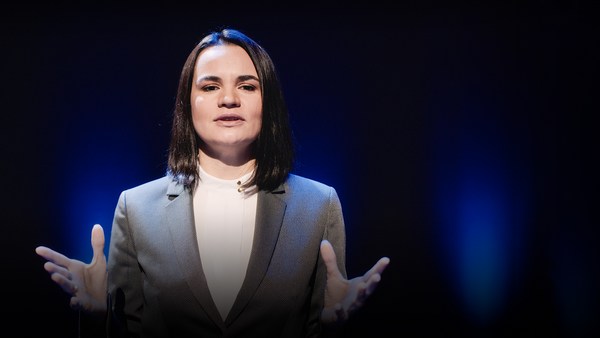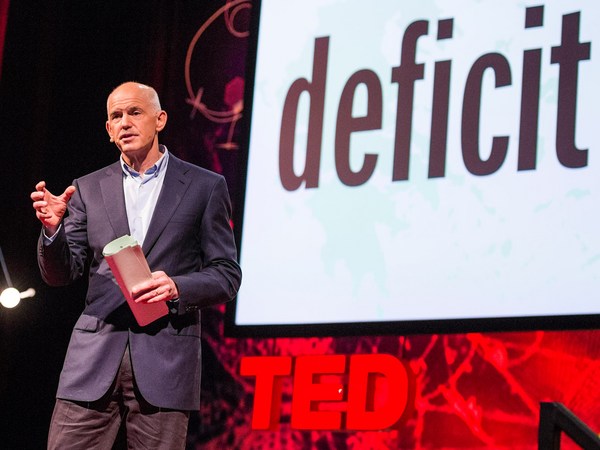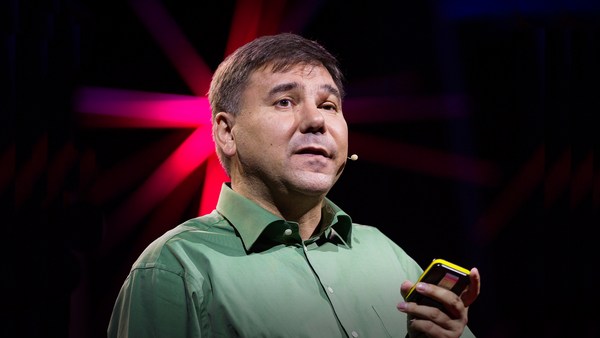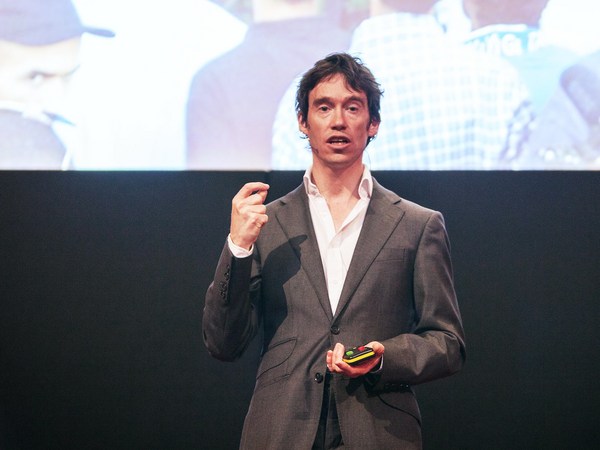(Māori) Kia ora koutou, everyone. I want to you today about democracy, about the struggles that it's experiencing, and the fact that all of us together in this room might be the solution. But before I get onto that, I want to take a little detour into the past.
This is a picture from Athens, or more specifically, it's a picture of a place called the Pnyx, which is where, about two and a half thousand years ago, the ancient Greeks, the ancient Athenians, gathered to take all their major political decisions together. I say the ancient Athenians. In fact, it was only the men. Actually, it was only the free, resident, property-owning men. But with all those failings, it was still a revolutionary idea: that ordinary people were capable of dealing with the biggest issues of the time and didn't need to rely on a single supposedly superior ruler. It was, you know, it was a way of doing things, it was a political system. It was, you could say, a democratic technology appropriate to the time.
Fast-forward to the 19th century when democracy was having another flourishing moment and the democratic technology that they were using then was representative democracy. The idea that you have to elect a bunch of people -- gentlemen, in the picture here, all gentlemen, at the time, of course -- you had to elect them to look after your best interests. And if you think about the conditions of the time, the fact that it was impossible to gather everybody together physically, and of course they didn’t have the means to gather everyone together virtually, it was again a kind of democratic technology appropriate to the time.
Fast-forward again to the 21st century. And we're living through what's internationally known as the crisis of democracy. What I would call the crisis of representative democracy, the sense that people are falling out of love with this as a way of getting things done, that it's not fundamentally working. And we see this crisis take many forms in many different countries. So in the UK, you see a country that now at times looks almost ungovernable. In places like Hungary and Turkey, you see very frighteningly authoritarian leaders being elected. In places like New Zealand, we see it in the nearly one million people who could have voted at the last general election, but who chose not to.
Now these kinds of struggles, these sort of crises of democracy have many roots, of course, but for me, one of the biggest ones is that we haven't upgraded our democratic technology. We're still far too reliant on the systems that we inherited from the 19th and from the 20th century. And we know this because in survey after survey people tell us, they say, “We don’t think that we’re getting a fair share of decision-making power, decisions happen somewhere else." They say, “We don’t think the current systems and our government genuinely deliver on the common good, the interests that we share as citizens." They say, “We’re much less deferential than ever before, and we expect more than ever before, and we want more than ever before to be engaged in the big political decisions that affect us.” And they know that our systems of democracy have just not kept pace with either the expectations or the potential of the 21st century. And for me, what that suggests is that we need a really significant upgrade of our systems of democracy.
That doesn't mean we throw out everything that's working about the current system, because we will always need representatives to carry out some of the complex work of running the modern world. But it does mean a bit more Athens and a bit less Victorian England. And it also means a big shift towards what's generally called everyday democracy. And it gets this name because it's about finding ways of bringing democracy closer to people, giving us more meaningful opportunities to be involved in it, giving us a sense that we're not just part of government on one day, every few years when we vote, but we're part of it every other day of the year.
Now that everyday democracy has two key qualities that I've seen prove their worth time and again, in the research that I've done. The first is participation because it's only if we as citizens, as much as possible, get involved in the decisions that affect us, that we'll actually get the kind of politics that we need, that we'll actually get our common good served. The second important quality is deliberation. And that's just a fancy way of saying high-quality public discussion, because its all very well people participating, but it's only when we come together and we listen to each other, we engage with the evidence, and reflect on our own views, that we genuinely bring to the surface the wisdom and the ideas that would otherwise remain scattered and isolated amongst us as a group. It's only then that the crowd really becomes smarter than the individual.
So if we ask what could this abstract idea, this everyday democracy actually look like in practice, the great thing is we don't even have to use our imaginations because these things are already happening in pockets around the world. One of my favorite quotes comes from the science fiction writer, William Gibson, who once said, "The future's already here, it's just unevenly spread." So what I want to do is share with you three things from this unevenly spread future that I'm really excited about in terms of upgrading the system of democracy that we work with. Three components of that potential democratic upgrade.
And the first of them is the citizens assembly. And the idea here is that a polling company is contracted by government to draw up, say, a hundred citizens who are perfectly representative of the country as a whole. So perfectly representative in terms of age, gender, ethnicity, income level and so on. And these people are brought together over a period of weekends or a week, paid for their time and asked to discuss an issue of crucial public importance. They're given training on how to discuss issues well with each other, which we'll all know of course, from our experiences of arguing online, if nowhere else, is not an ability that we're all born with innately, more’s the pity. In the citizens assembly, people are also put in front of evidence and the experts, and they're given time to discuss the issue deeply with their fellow citizens and come to a state of consensus recommendations. So these kinds of assemblies have been used in places like Canada, where they were used to draw up a new national action plan on mental health for the whole country. A citizens assembly was used recently in Melbourne to basically lay the foundation of a new 10-year financial plan for the whole city. So these assemblies can have real teeth, real weight.
The second key element of the democratic upgrade: participatory budgeting. The idea here is that a local council or a city council takes its budget for spending on new buildings, new services, and says, we're going to put a chunk of this up for the public to decide, but only after you've argued the issues over carefully with each other. And so the process starts at the neighborhood level. You have people meeting together in community halls, in basketball courts, making the trade-offs, saying, "Well, are we going to spend that money on a new health center, or are we going to spend it on safety improvements to a local road?" People using their expertise in their own lives. Those discussions are then pushed up to the suburb or ward level, and then again, to the city level and in full view of the public, the public themselves makes the final allocation of that budget. And in the city where this all originated, Porto Alegre in Brazil, a place with about a million inhabitants, as many as 50,000 people get engaged in that process every year.
The third element of the upgrade: online consensus forming. In Taiwan a few years ago, when Uber arrived on their shores, the government immediately launched an online discussion process using a piece of software called Polis, which is also coincidentally, or not coincidentally, what the ancient Athenians call themselves when they were making their collective decisions. And the way Polis works is it groups people together, and then using machine learning and a bunch of other techniques, it encourages good discussion amongst those participating. It allows them to put up proposals, which are then discussed, knocked back, refined, until they reach something like 80 percent consensus. And in the time, in this case, within about four weeks, this process had yielded six recommendations for how people wanted to see Uber regulated. And those, almost all of them, were immediately picked up by the government and accepted by Uber.
Now I find these examples really inspiring. People sometimes ask me why I'm an optimist and a large part of the answer is these kinds of innovations, because I think they, you know, they're really show us that we can have a kind of politics which is deeply responsive to our needs as citizens, but which avoids the peril of the threats to human liberties, the threats to civil liberties that authoritarian populism descends into. They show us that even though we live in what looks like quite a dark time, there are things that act a bit like emergency lighting, guiding us towards something better. And although these are all ideas from the Western tradition, they can also be combined with, adapted by Indigenous traditions that also value turn-taking in speech and consensus decision-making. And the thread that binds all these traditions together is essentially a faith in other people. A faith in people's ability to handle difficult decisions, a faith in people's ability to come together and make political decisions intelligently. In the Polis example, we see that government can be agile and nimble in the face of tech disruption. In the participatory budgeting, we see that we can build systems that are disproportionately used by poor people and which deliver infrastructure that is better quality than the traditional systems. In citizens assemblies, the experts who observed them time and again, say that in those good conditions people's ability to listen to others, to engage with the evidence, and to shift from their entrenched views is consistently astounding.
And that's a really, really hopeful finding, because, you know, I think we live at a time where you see right around the world, huge suspicion of other people, of other citizens, huge doubts about whether people are really able to bear the burden of decision-making that democracy places on them. But if you're worried, for instance, about whether a lot of people out there, you know, are misinformed or fallen prey to online propaganda, what better way to push back against that than by ensuring that they're placed in forums. Forums like the New England town hall meetings shown here. Forums where they have to come face-to-face with other people, or at least be in close virtual contact, where they have to justify their opinions, have to deal with the evidence, and are encouraged to step away from their prejudices.
The Canadian philosopher Joseph Heath says that rationality, our ability to make good decisions, isn't something that we achieve as individuals, if we achieve it at all. It's something we achieve in groups. Our best hope of rationality is each other. Or to put the thing a different way, the problem with democracy is not other people, it's not other citizens. The problem is the situations in which they -- in which we all -- have been asked to do our democratic work. The problem is the outdated democratic technology that we've all been forced to use. And so what these examples show to me, the reason I find them inspiring, is that I think they demonstrate that if you get the situations right, if you get the technology upgraded, then actually the things that we do when we come together as citizens can be astounding, and together, we really can build a form of democracy that's genuinely fit for the 21st century.
Thank you very much.
(Applause)
